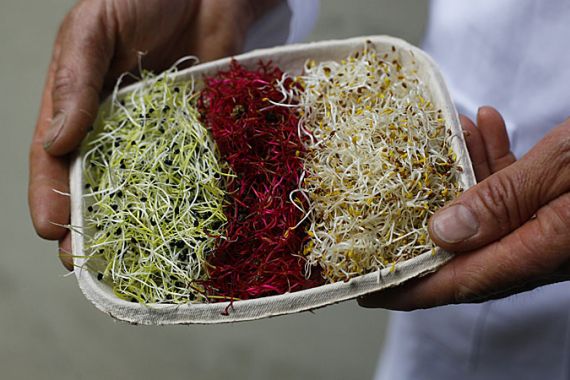Bean sprouts likely source of E. coli crisis
German authorities say enough evidence points towards locally-grown vegetables as source of deadly bacteria.

Reinhard Burger, president of the Robert Koch Institute, said people who ate the sprouts were nine times more likely to have symptoms of the bacteria infection than those who did not.
“In this way it was possible to narrow down epidemiologically the cause of the outbreak of the illness to the consumption of sprouts,” he told reporters at a news conference.
Keep reading
list of 4 itemsPalestinian Prisoner’s Day: How many are still in Israeli detention?
‘Mama we’re dying’: Only able to hear her kids in Gaza in their final days
Europe pledges to boost aid to Sudan on unwelcome war anniversary
Tests conducted on samples of sprouts have so far come back negative, but authorities believe the pattern of the outbreak produced enough evidence to draw conclusions.
Andreas Hensel, head of the Risk Assessment agency, said that authorities were lifting the warning against eating cucumbers, tomatoes and lettuce.
Unanswered questions
The investigation has focused on an organic sprout farm in the northern state of Lower Saxony, which has been shut down.
It cultivates sprouts from a variety of products, including lettuce, azuki beans, mung beans, fenugreek, alfafa and lentils.
The farm has previously said it does not use animal-based fertiliser and could not understand how the bacteria could have developed.
But officials said infected seeds or poor hygiene may have caused the contamination.
Stefan Etgeton, head of health for Germany’s consumer protection agency, told Al Jazeera that it is still unclear how the bacteria could have entered the sprouts.
“We don’t know how the bacteria got into the sprouts – was it the seed, was it the water, was it some person put it onto the sprouts?
“So we have to examine this and then we can say more about whether this entire company is the source or whether people should keep off sprouts.
“We know that in 75 per cent of cases we don’t find out the sources at all.”
European farmers have lost hundreds of millions of dollars worth of sales due to the warning over salad vegetables, and false accusations that the source came from Spanish cucumbers.
German authorities later retracted the statement based on subsequent tests, infuriating Madrid and sparking threats of lawsuits.
The European Union also criticised Russia for imposing a “disproportionate” blanket ban on vegetable imports from the 27-nation bloc.
Moscow agreed at a summit with the EU on Friday to lift the ban although it was not immediately clear when the announcement would come into effect.